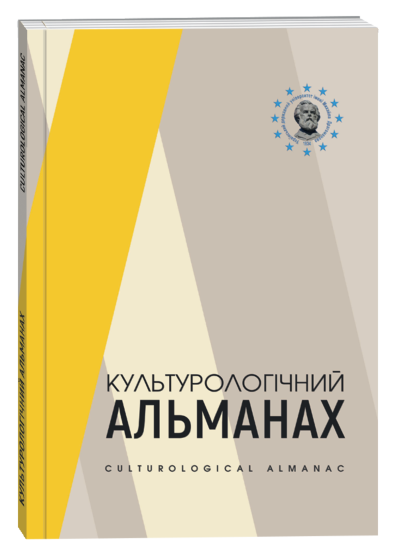NATURE AND CULTURE IN FOCUS OF “NEW ANTHROPOLOGY”
DOI:
https://doi.org/10.31392/cult.alm.2023.2.40Keywords:
nature, culture, cogito, selves, representation, multiculturalism, multinaturalism.Abstract
This article analyzes the opposition between nature and culture in the context of «new anthropology». The relationship between nature and culture needs to be reevaluated because the Western mechanical interpretation of nature is subject to criticism. An innovative research methodology is offered by the «new anthropology» of B. Latour, E. V. de Castro, E. Kohn, T. Junkaporta, F. Descola, T. Morton, whose scientific works are significantly influenced by the legacy of K. Lévi-Strauss. The dichotomy of «nature-culture» turned out to be a tangible cognitive obstacle for the development of social sciences and humanities. The attempt to justify the exclusivity of man in comparison with other living beings has been repudiated. The expansion of anthropology beyond the boundaries of man implies a methodological approach not limited to purely human qualities, such as language, culture, and history, but focuses attention on non-human beings and the variety of connections between them and man. Non-human life forms are also involved in the process of representing the world. They possess an agency that goes beyond the human. Such representations, in addition to the symbolic (characteristic of a person), are inherent in all forms of life. Semiotics is characteristic of all biological processes. Symbolic reference is an emergent dynamic embedded in the broader semiosis of life from which it originates and on which it depends. The «new anthropologists» offer an expanded understanding of the self. They explicate a dense multispecies ecology of selves, which includes not only humans, animals, and plants, but also many other elements that shape life. To be considered a self does not necessarily involve the symbolic reference, subjectivity, or consciousness that we usually associate with representation. The self does not necessarily coincide with the boundaries of the organism, but can also be distributed among bodies. Non-human organisms are selves, and biotic life is a symbolic process. Not only can the self be represented, but it also represents itself. There are many natures, but there is only one culture – the perspective that any self, human or non-human, takes. Culture in this sense is the perspective of the self and selves. It has been established that the multiculturalist paradigm is based on the unity of nature, which guarantees the objective universality of bodies and bodily substance, and on the plurality of cultures, which are generated by the subjective peculiarity of consciousnesses and signified. The new approach, on the contrary, assumes the unity of the spirit and the diversity of bodies. In the projects of the «new anthropologists», mononaturalism changes to multinaturalism. This indicates the inevitable defeat of multiculturalism, since the latter acts as an adjunct to mononaturalism. It is emphasized that our culture and our vision of nature is just a special case in the intricate configuration of many pictures of the world, in the general gamut of «metaphysics». We do not have the right to consider our perception of the world as the only true one, and therefore as a reference.
References
Бауман З. Модерність і Голокост / пер. з англ. К. Диси. Київ : ДУХ І ЛІТЕРА. 344 с.
Castro, E. V. de. (2014). Cannibal Metaphysics. For a Post-structural Anthropology / edited and translated by Peter Skafish. Minneapolis : Univocal Publishing. 229 p.
Courtés, J. (1973). Lévi-Strauss et les contraintes de la pensée mythique: une lecture sémiotique des «Mythologiques». Univers sémiotiques. Pari s: Mame. 187 p.
Дерида, Ж. (2004). Письмо і відмінність / пер. з фр. В. Шовкуна. Київ : Вид-во Соломії Павличко «Основи». 602 с.
Descola, Ph. (2005). Par-dela nature et culture. Paris : Editions Gallimard. 792 p.
Hawking, St., Mlodinow, L. (2010). The Grand Design. New York : Bantam Books. 198 p.
Kac, E. (1998). Transgenic art. URL: http://www.ekac.org/transgenic.html.
Kohn, E. (2013). How Forests Think. Toward an Anthropology Beyond the Human. Berkeley, Los Angeles, London : University of California Press. 267 p.
Latour, B. (2004). Politics of Nature. How to Bring the Sciences into Democracy / translated by C. Porter. Cambridge, Massachusetts; London, England : Harvard University Press. 307 p.
Latour, B. (2005). Reassembling the Social. An Introduction to Actor-Network-Theory. New York : Oxford University Press. 301 p.
Levi-Strauss, C. (1999). Race et histoire. Paris : Denoël. 129 p.
Morton, T. (2007). Ecology without Nature. Rethinking environmental aesthetics. Cambridge, Massachusetts; London, England : Harvard University Press. 249 p.
Schaeffer, J.-M. (2005). La these de l’exception humaine et le prometheisme de la connaissance. Communications. № 78. P. 189–209.
Yunkaporta, T. (2019). Sand Talk: How Indigenous Thinking Can Save the World. Melbourne : The Text Publishing Company. 224 pp.








